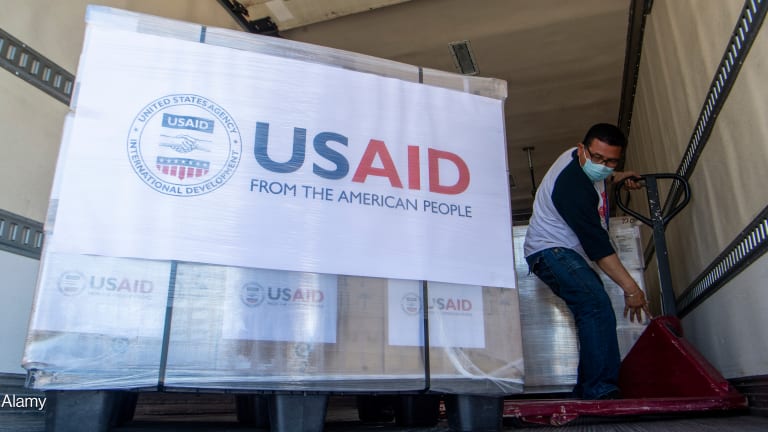
America’s response to the humanitarian crisis in Ukraine could be unfolding with even more effectiveness and at a lower cost to taxpayers if our standard humanitarian policy was more anticipatory. An anticipatory-dominant approach has been long-requested and fought for by humanitarians who have passionately dedicated their lives to helping communities in need.
In the current waking nightmare that Russian President Vladimir Putin has visited upon Ukraine, the magnitude of the immediate required humanitarian response is simply unprecedented. In the first 28 days of Russia’s invasion of Ukraine, more than 3.6 million terrified refugees — most of them women and children — fled west from Ukraine into neighboring countries. Nearly 6.5 million more people remain displaced within Ukraine’s borders.
The U.S. government can become a more anticipatory humanitarian actor, responding to future risks rather than existing needs.
—The U.S. intelligence community predicted the Russian invasion to the day, and yet, most of the humanitarian aid arrived after the invasion. This practice is a hallmark of a traditional humanitarian response.
Some vital preparations were made, such as the repositioning of humanitarian and military aid along Ukraine’s border but what if cash transfers were issued to poor Ukrainians to subsidize the cost of evacuation in the weeks prior? What if large unused housing facilities were prepared near borders in anticipation of inevitable mass migration?
If anticipatory action occurred and aid was provided in response to U.S. intelligence early warnings before the invasion, it is quite possible that this crisis would be unfolding differently for refugees. At the very least, peoples’ suffering could be mitigated.
This anticipatory approach, taking strategic action before the onset of an anticipated shock, could be applied across humanitarian crises. Meaning, in times of crisis, people would be equipped with the resources they need to cope as the crisis is unfolding. Not only would this approach allow for a more efficient allocation of finite resources, but it would also reduce the harms that crises inflict by ensuring that people have what they need when they need it.
Evidence from the World Food Programme shows that an anticipatory approach is more effective and cheaper than a traditional approach, and saves more lives and livelihoods. Decades in development, today’s predictive analytics allow 50% of all humanitarian crises to be predictable, and 20 % of humanitarian crises highly predictable.
Humanitarian crises are becoming increasingly complex and protracted, driven by conflict, and exacerbated by climate change and COVID-19. The number of people in need of humanitarian assistance around the world has tripled, from approximately 78 million in 2015 to an unprecedented projection of 274 million in 2022. In this same timeframe, humanitarian funding requirements established by the United Nations have more than doubled from $16.4 billion to $41 billion, while international humanitarian spending has flatlined.
With the full-fledged war in Ukraine and Yemen on the brink of “catastrophe,” among other ongoing crises, the number of people in need of humanitarian assistance, and the financial resources to provide it, will likely increase these projections.
While anticipatory action promises to save more lives and livelihoods, implementation challenges abound. Funding resources are limited, and resource investment toward preventing a possible event is difficult amid numerous ongoing, underfunded humanitarian crises. Institutional inertia can impede actions based on predictions. Moreover, the evidence measuring the impacts of anticipatory action is still in its infancy, making such actions harder to justify among competing interests.
But in this worsening context, the speed of the U.S. humanitarian response is paramount, and options to speed up responses and decrease costs must be explored. The U.S. government can become a more anticipatory humanitarian actor, responding to future risks rather than existing needs by taking actions in response to triggers before they become a crisis.
For decades, civil servants have dedicated their careers to developing and advocating for an anticipatory action agenda within the U.S. humanitarian apparatus. Until this moment, they have been only partially successful.
The Ukraine tragedy offers a moment — a rare opening — for consideration of that collected wisdom to reset U.S. humanitarian policy. In the face of sharply rising humanitarian needs, the resulting unsustainable strain on the humanitarian system, and limited resource availability, the U.S. government must further develop and act on strategies to improve humanitarian impact with the same, or fewer, resources.
One significant part of addressing this problem is shifting the core doctrine of how the United States provides humanitarian aid from reactive to anticipatory whenever possible — and reactive as necessary. This policy shift is essential if the U.S. government is to provide more effective humanitarian assistance and reduce the negative humanitarian impacts of the complex crises we know are coming.




